Israel's Bennet Speaks After Airstrike On Syria's Latakia Port
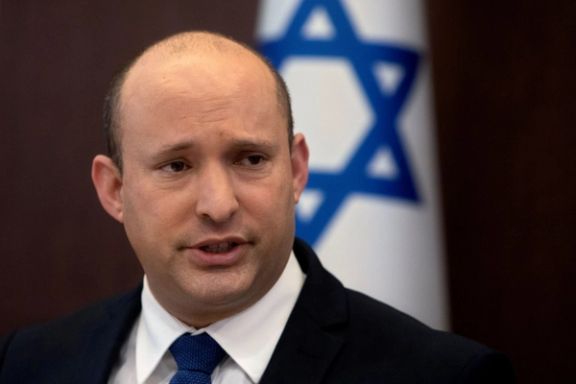
Israeli Prime Minister Naftali Bennett on Tuesday vowed that Israel would continue to push back against what he called "destructive forces" in the region.

Israeli Prime Minister Naftali Bennett on Tuesday vowed that Israel would continue to push back against what he called "destructive forces" in the region.
Bennett was speaking during a meeting with the leaders of Cyprus and Greece.
His comments came as Syrian state media reported that Israeli warplanes fired missiles at the port of Latakia earlier in the day.
Israel has attacked hundreds of Iran-related military bases and positions in Syria since 2017, but the port of Latakia is not a usual target.
Syria's state media quoted an unnamed military official as saying that several missiles struck the containers area in the port, setting some of them on fire.
The Britain-based Syrian Observatory for Human Rights, an opposition war monitoring group, said the airstrike hit arms shipments for fighters loyal to Iran.
There was no comment from the Israeli military.
Israel has previously acknowledged, however, that it targets the bases of Iran-allied militias, such as Lebanon's militant Hezbollah group that has fighters deployed in Syria.
It says it attacks arms shipments believed to be bound for the militias.
Report by AP
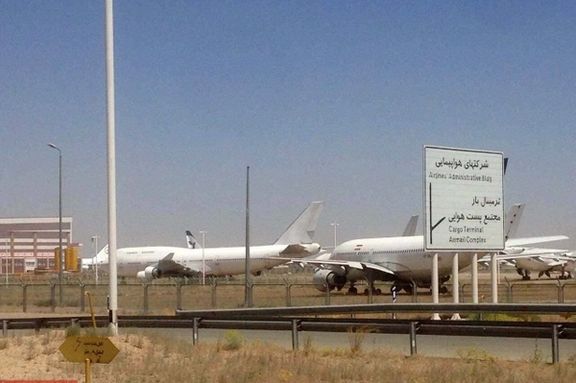
More than 50 percent of Iran’s passenger planes are idle due to lack of spare parts, particularly engines, a trade representative told local media on Monday.
In an interview with state-controlled media, Alireza Barkhor, deputy chairman of the Association of Iranian Airlines asked for government assistance to airlines for repairing and procuring spare parts. He said that lack of money and sanctions have prevented essential maintenance and repair work on Iran’s aging fleet.
Barkhor is a former air force captain appointed to civilian government positions, according to common practice by the Islamic Republic.
“Currently, more than 170 planes are grounded for lack of financial resources and restrictions due to sanctions,” Barkhor said and added that if this trend continues, more planes will become non-operational in the near future.
The United States banned the sale of aircraft and parts to Iran in 1995, and because most passenger planes are manufactures by outsourcing parts to hundreds of companies, the sanction practically makes it impossible for most manufacturers to sell parts.
In addition to the ban on aircraft sales, the US also reimposed banking sanctions on Iran in 2018 that would penalize any financial institution or bank for dealing with Iran. Therefore, payments to established aviation companies become out of question.
Iran suffered from shortages of civilian airliners since the 1990s and used a variety of ways to lease older Russian planes or buy spare parts through intermediaries, but the technical state of its fleet was deteriorating, before a brief reprieve.
When the 2015 nuclear agreement, JCPOA, went into effect sanctions on purchases of Western aircraft were lifted and Iran began talks to buy aircraft from Boeing and Airbus. A few airbus planes were delivered but the newly elected Trump administration never approved sale of US planes until Washington withdrew from the JCPOA in May 2018 and reimposed sanctions.
Earlier this year, Barkhor had said that Iranian airlines are on the verge of bankruptcy, confirming that the government’s flagship Iran Air had $800 million in debt. He had also said that without piecemeal government help these companies would have already gone bankruptcy.
In September, an aide to President Ebrahim Raisi promised assistance to Iran Air but so far nothing has materialized. The government is under tremendous financial pressures and Iran’s currency, rial, has fallen 25 percent since Raisi took office in August.
Everything hinges on Iran’s negotiations with the United States over restoring the JCPOA and lifting sanctions. The Raisi government, however, has toughened Tehran’s posture in the talks and a round of negotiations in Vienna last week ended without success. Diplomats and observers are pessimistic over the talks.
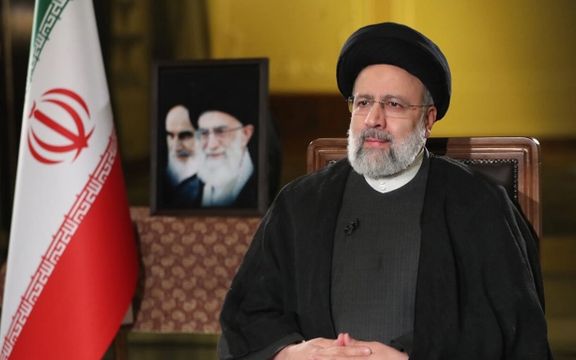
Media in Iran have criticized President Ebrahim Raisi for evading significant questions during his recent televised, including on the issue of nuclear talks.
The much-advertised interview broadcast by Channel One of the state-run television in a prime time slot had nothing new and concrete to offer, critics of the hardline president say. They allege that the interview was held in a highly controlled "green-house environment", questions were dictated by the interviewee, and it was a "monologue" and propaganda event rather than a real, challenging interview.
"Green-house interviews may shield the President from the harms of exposure to the media sun, rain, and wind. But this makes him equally vulnerable as he may catch a cold even if a small media breeze suddenly gets through a window!" Reformist Etemad daily wrote Tuesday.
The conservative Jomhouri Eslami newspaper also warned that officials of the Islamic Republic will never be able to convince the public as long as they avoid interviews with free and independent journalists.
The hardliner media affiliated with the Revolutionary Guard and ruling circles have stayed mostly silent about the TV program.
Many have also pointed out that the interviewer repeatedly sang praises of the Raisi administration and its "achievements" while posing his questions. "Niceties [by the presenter] were so exaggerated that it appeared as if an employee is paying lip service to his employer," conservative Asr-e Iran website charged in a commentary Monday entitled "This Is Not an Interview, It's a PR Talk Between Boss and Civil Servant".
The presenter only asked about the nuclear talks in Vienna towards the end of the one-hour talk, to which Raisi gave a very general and short answer.
He avoided referring to the revival of the 2015 nuclear deal, Joint Comprehensive Plan of Action (JCPOA) and only talked about the importance of "lifting of sanctions", a matter of great importance to the Iranian economy, which nevertheless needs an agreement with the United States.
The conservative Jomhouri Eslami newspaper and some other media outlets have also criticized the president for offering completely irrelevant answers to some pre-determined questions.
Raisi told his audience there was no money in the government's coffers when it was handed over to him and claimed that notwithstanding the fact, his administration managed to pay civil servants' salaries without borrowing from the Central Bank. When asked how the government managed this, he responded that the government must harness tax evasion and sell government assets such as real estate that are not in active use.
"The presenter had not asked about your plans to secure budgetary resources, he was asking how this could happen in the three months [since you took office]," Asr-e Iran website asked in another commentary Monday entitled "What Was Raisi's Response to the Most Important Question?"
In fact, Iran’s former central bank chief Abdolnasser Hemmati said after Raisi’s TV talk, that the government has simply borrowed for state and quasi-state banks and they in turn borrowed money from the central bank. He said this is tantamount to printing more money, which the new government has pledged not to do.
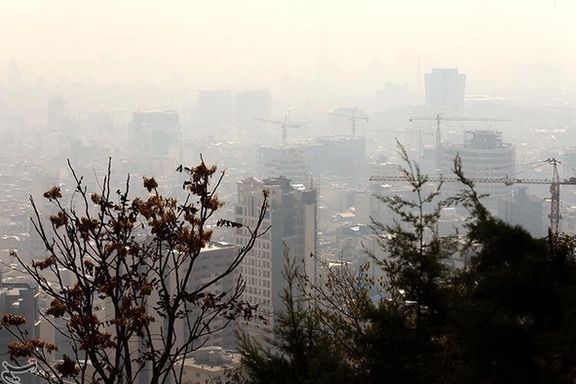
Authorities in Iran’s capital Tehran and suburbs will close educational institutions two days a week as air pollution has reached a dangerous level in winter.
Tehran province governor’s office announced on Tuesday that measures were necessary to reduce pollution and protect citizens by closing all educational institutions and limiting commercial activities on Wednesdays and Thursdays each week.
Air pollution is a persistent problem in large Iranian cities, especially in cold and hot weather when more electricity is used and power stations resort to using heavy dirty diesel fuels because of natural gas shortages. Last winter, power plants had to be shut down prompting power cuts that led to some protests. The situation is expected to get worse in January and February.
Iran has the world’s second largest natural gas reserves, but consumption is much higher than in other countries while production remains flat due to lack of investment and new technologies.
Authorities have also banned operations of polluting industrial plants for two days a week and will clamp down on vehicles without a clean bill of health. Many private and large vehicles in Iran are old, using outdated technology as the government strictly limits imports of modern vehicles to support local manufacturing.
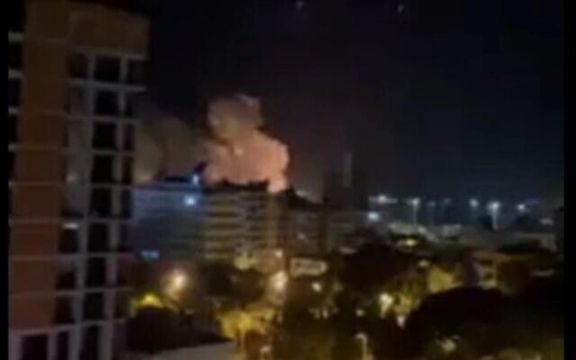
AP - Syria's military said Israeli warplanes fired missiles on the port of the coastal city of Latakia early on Tuesday without inflicting any human losses.
Syria's state media quoted an unnamed military official as saying that several missiles struck the containers area in the port setting some of them on fire.
The official gave no further details.
It was a rare attack on the port of Latakia, a vital facility where much of Syria's imports are brought into the war-torn country.
Syrian state TV reported that five explosions were heard in the port and a huge fire erupted in the containers area and fire engines have rushed to the port.
There was no comment from the Israeli military.
Israel has staged hundreds of strikes on targets inside government-controlled Syria over the years but rarely acknowledges or discusses such operations.
Some of the strikes in the past had targeted the main airport in the capital Damascus.
Israel has acknowledged, however, that it targets the bases of Iran-allied militias, such as Lebanon's Hezbollah group that has fighters deployed in Syria.
Israel says Iranian presence on its northern frontier is a red line, justifying its strikes on facilities and weapons inside Syria.
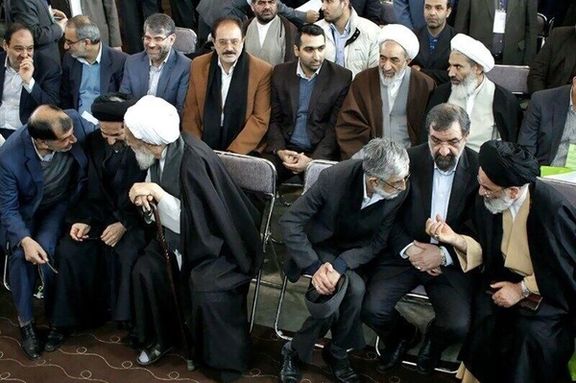
Iran’s conservatives supporters Supreme Leader Ali Khamenei, are divided like an archipelago with many small islands linked by loose bridges, a pundit has said.
Speaking in an interview with Khabar Online website, conservative analyst Hossein Kanani Moqaddam said every single one of those tiny islands has its own ruler.
Kanani Moqaddam, the political secretary of the Iranian conservative camp's Resilience Front also tried to define the conservative's status in Iran's politics by explaining that although they are in power, they lack coherence.
However, unlike Kanani Moqaddam, prominent conservative analyst Naser Imani has said that conservatives in Iran are better organized than the country's reformists, although both are more unpopular today as they have ever been.
Other analysts, including Tehran University academic Kiumars Ashtarian separates the traditional conservative camp from its newest wing that is nicknamed as "the revolutionary current." It consists of young hardliner conservatives in the Iranian parliament. According to Ashtarian, those who belong to this group are driven by their dreams and illusions, a characteristic that brings them under the general label of idealists.
However, Ashtarian believes that these young hardliners will be soon diverted to the main track of conservatism in Iran once they experience the reality of Iranian politics and come face to face with its barriers at the parliament.
Another non-traditional wing of Iran's conservative camp is known as the ultraconservative Paydari party, who are mostly former supporters and officials of ex-president Mahmoud Ahmadinejad.
Like many other observers, Kanani Moqaddam believes that Paydari always finds it difficult to be a team player. The party has been frequently accused of preventing coherence in the conservative camp by disrupting any balancing coalition at the last moment. This has been happening over and over in all parliamentary and presidential elections after the 2009 presidential election.
Asked to pass his judgment about the status of President Raisi and Ahmadinejad in the conservative camp, Kanani Moqaddam said Ahmadinejad has never been a conservative. He simply used Iran's conservatives as a ladder to climb the political structure and claim the President's seat. Once he made it to the presidency, he let down his conservative allies, Kanani Moqaddam said.
His judgment about Rouhani was different. According to Kanani Moqaddam, a former lawmaker said that Rouhani was a conservative who made it to the presidential palace by an alliance with Iran's reformists and moderates. However, according to Kanani Moqaddam, the main element that led to Rouhani's victory in the election was the bad record of President Ahmadinejad and his populist administration. The people did not want another president like Ahmadinejad, he said.
Meanwhile, Kanani Moqaddam added that Raisi's election as President has led to a fierce rivalry among conservative groups and further divided the conservative camp as every group tried to seize as much power and financial resources as they could.
On the likelihood of Raisi's success in the absence of non-conservative challengers in Iran's political landscape, Kanani Moqaddam opined that regardless of the situation Raisi is unlikely to be able to solve Iran's problems during the first four years of his presidency. However, he did not say what is likely to happen if few vote for him for a second term, or if Khamenei who engineered his victory in June 2021, concludes that Raisi should be replaced.